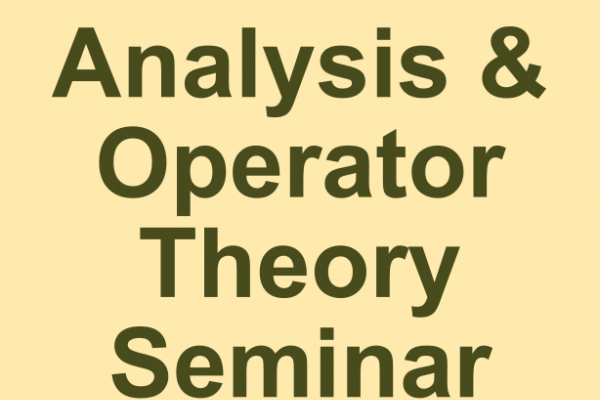
November 19, 2020
11:00 am
-
11:50 am
Zoom
Add to Calendar
2020-11-19 12:00:00
2020-11-19 12:50:00
Analysis and Operator Theory Seminar - Andrea Cianchi
Title: Symmetric gradient Sobolev embeddings involving rearrangement-invariant norms
Speaker: Andrea Cianchi - University of Florence, (Italy)
Abstract: A unified approach to embedding theorems for Sobolev type spaces of vector-valued functions, defined via their symmetric gradient, is proposed. The Sobolev spaces in question are built upon general rearrangement-invariant norms. Optimal target spaces in the relevant embeddings are determined within the class of all rearrangement-invariant spaces. In particular, all symmetric gradient Sobolev embeddings into rearrangement-invariant target spaces are shown to be equivalent to the corresponding embeddings for the full gradient built upon the same spaces.
A sharp condition for embeddings into spaces of uniformly continuous functions, and their optimal targets, are also exhibited. By contrast, these embeddings may be weaker than the corresponding ones for the full gradient. Related results, of independent interest in the theory of symmetric gradient Sobolev spaces, are established. They include global approximation and extension theorems under minimal assumptions on the domain. A formula for the $K$-functional, which is pivotal for our method based on reduction to one-dimensional inequalities, is provided as well. The case of symmetric gradient Orlicz-Sobolev spaces, of use in mathematical models in continuum mechanics driven by nonlinearities of non-power type, is especially focused.
Zoom
OSU ASC Drupal 8
ascwebservices@osu.edu
America/New_York
public
Date Range
2020-11-19 11:00:00
2020-11-19 11:50:00
Analysis and Operator Theory Seminar - Andrea Cianchi
Title: Symmetric gradient Sobolev embeddings involving rearrangement-invariant norms
Speaker: Andrea Cianchi - University of Florence, (Italy)
Abstract: A unified approach to embedding theorems for Sobolev type spaces of vector-valued functions, defined via their symmetric gradient, is proposed. The Sobolev spaces in question are built upon general rearrangement-invariant norms. Optimal target spaces in the relevant embeddings are determined within the class of all rearrangement-invariant spaces. In particular, all symmetric gradient Sobolev embeddings into rearrangement-invariant target spaces are shown to be equivalent to the corresponding embeddings for the full gradient built upon the same spaces.
A sharp condition for embeddings into spaces of uniformly continuous functions, and their optimal targets, are also exhibited. By contrast, these embeddings may be weaker than the corresponding ones for the full gradient. Related results, of independent interest in the theory of symmetric gradient Sobolev spaces, are established. They include global approximation and extension theorems under minimal assumptions on the domain. A formula for the $K$-functional, which is pivotal for our method based on reduction to one-dimensional inequalities, is provided as well. The case of symmetric gradient Orlicz-Sobolev spaces, of use in mathematical models in continuum mechanics driven by nonlinearities of non-power type, is especially focused.
Zoom
America/New_York
public
Title: Symmetric gradient Sobolev embeddings involving rearrangement-invariant norms
Speaker: Andrea Cianchi - University of Florence, (Italy)
Abstract: A unified approach to embedding theorems for Sobolev type spaces of vector-valued functions, defined via their symmetric gradient, is proposed. The Sobolev spaces in question are built upon general rearrangement-invariant norms. Optimal target spaces in the relevant embeddings are determined within the class of all rearrangement-invariant spaces. In particular, all symmetric gradient Sobolev embeddings into rearrangement-invariant target spaces are shown to be equivalent to the corresponding embeddings for the full gradient built upon the same spaces.
A sharp condition for embeddings into spaces of uniformly continuous functions, and their optimal targets, are also exhibited. By contrast, these embeddings may be weaker than the corresponding ones for the full gradient. Related results, of independent interest in the theory of symmetric gradient Sobolev spaces, are established. They include global approximation and extension theorems under minimal assumptions on the domain. A formula for the $K$-functional, which is pivotal for our method based on reduction to one-dimensional inequalities, is provided as well. The case of symmetric gradient Orlicz-Sobolev spaces, of use in mathematical models in continuum mechanics driven by nonlinearities of non-power type, is especially focused.
